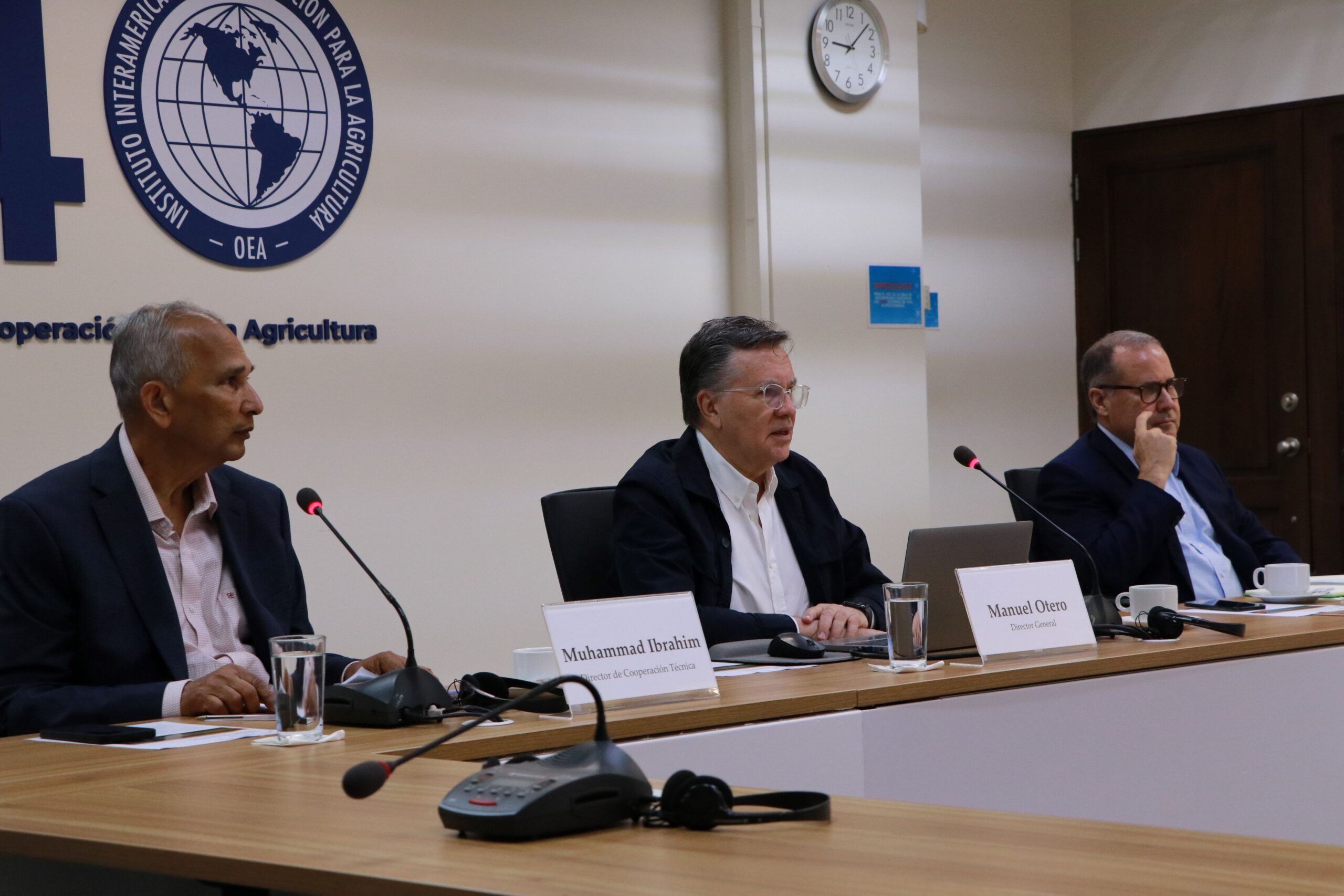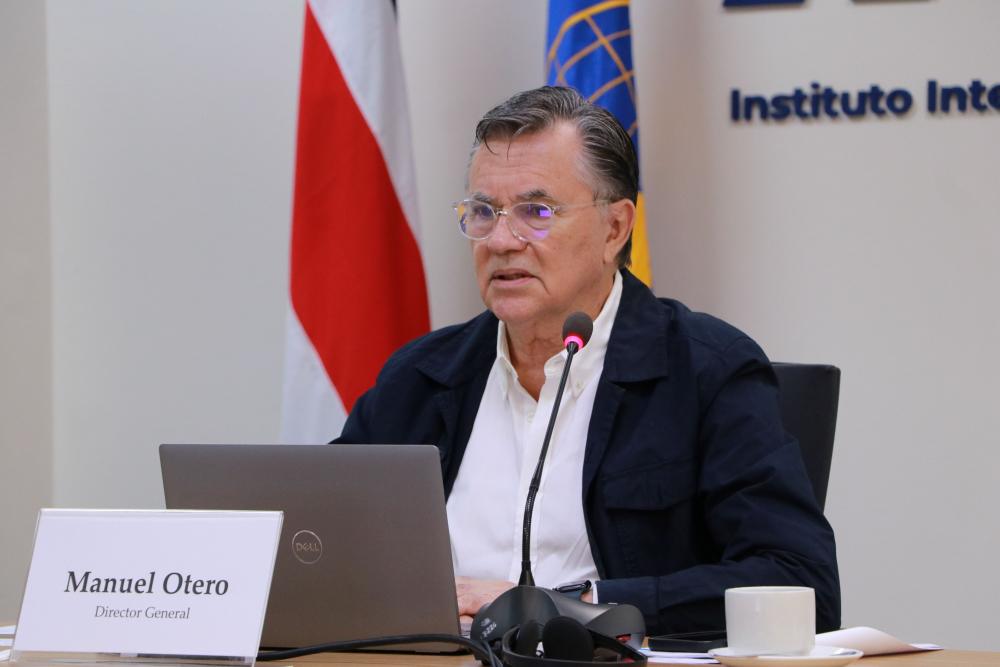The Living Soils in the Americas Program is raising awareness of the importance of soil health for global food security and is an instrument designed to contribute to the sustainability of agriculture and the quality of life in rural areas of the hemisphere.

San José, 27 August 2024 (IICA). The Living Soils in the Americas (LISAM) Program, spearheaded by the Inter-American Institute for Cooperation on Agriculture (IICA) and renowned scientist Rattan Lal, presented the most important outcomes it has achieved across the continent since its launch in 2020, thanks to its joint work with strategic partners from the public and private sectors.
The program is raising awareness of the importance of soil health for global food security, and is an instrument designed to contribute to the sustainability of agriculture and the quality of life in rural areas of the hemisphere.
The Third Meeting of the Board provided an opportunity to report on the results achieved by the initiative, which has given rise to a robust coalition that includes Bayer, Syngenta and Pepsico as key private sector actors, and has promoted concrete achievements in the efforts to combat the degradation of a resource that is essential for health and life.
Living Soils in the Americas links science, public policies and food companies with the work of soil restoration, and the program has made it possible to hold high-level events with decision makers, produce technical publications on practices for the recovery and recarbonization of soils, and create mechanisms for the dissemination of important information.
It has also promoted the participation of the agriculture sector of the Americas in the most important international forums, such as the most recent United Nations Climate Change Conferences (COP 27 and 28).
The virtual event included the presentation of the main results of three successful cases linked to the program: C-Farm, an initiative led by Professor Lal; C-Carbono, headed by the University of São Paulo; and Chakras, led by the Argentine No-Till Farmers Association (AAPRESID).
Carbon harvesting
Rattan Lal, regarded as the world’s leading soil scientist, presented the details and numbers of the project being carried out by the Lal Carbon Center at Ohio State University. The aim of the scientist’s work is for carbon to become a commodity, similar to the other commodities that farmers produce.

“Carbon farming is about carbon harvesting generating income for farmers, due to its environmental benefits. Increasing organic matter in the soil by just one percent greatly enhances water retention,” said Lal, who showed data on increased productivity in crops such as wheat, rice and sorghum thanks to higher organic carbon content in the soil.
He added that the success of any soil recovery strategy depends on cooperation with the private sector. “It is what can help us to convert science into action,” he explained. “The core goal is that no farmer to be left behind.”
Lal, 2020 World Food Prize Laureate, also highlighted the importance of the Living Soils Program being launched in Africa, based on IICA’s partnership with organizations on that continent, where agricultural yields have been stagnant for decades. “In the future,” he said, “we also hope to extend this work to Asia.”
Carlos Cerri presented the research of the University of São Paulo on good agricultural practices that the countries of the Americas can harness to increase carbon sequestration and reduce greenhouse gas emissions.
“We are learning more and know that there is enormous potential not only to sequester carbon in the soil, but also to prevent almost forty percent of emissions,” he pointed out.
The Chakras project promotes environmental conservation based on three pillars of agriculture: zero tillage, crop rotation and diversification, and permanent soil cover with crops or soil waste.
“We are working with the Confederation of American Associations for Sustainable Agriculture (CAAPAS) to gain an understanding of the capacity of soils to absorb organic carbon under the direct seeding system in Argentina, Brazil, Uruguay and Paraguay. And the plan is to expand the project to other Latin American countries,” explained Andrés Madias, from AAPRESID.
Regenerative agriculture
Bayer is committed to the global goal of increasing food production by fifty percent by 2050, without expanding the agricultural frontier or using more natural resources.
Felipe Albuquerque, Bayer’s Head of Sustainability for Latin America, explained that the company has set the goal of reducing greenhouse gas emissions by thirty percent for each kilogram of food produced.
“We have already shown that regenerative agriculture has a real, positive impact on productivity and environmental care. The great challenge is empowering small farmers to practice it. Bayer believes that science must underpin everything and that regenerative agriculture is the only way,” he said.
Patricia Toledo and Carlos Torres from Syngenta emphasized that the transformation of agriculture is possible only through innovation, and both highlighted the need to train small farmers in regenerative agriculture through private programs as well as public policies.
They also gave details of Livingro, Syngenta’s program that promotes ecological management practices in different agricultural systems using modern and diverse crop protection technologies.
The Director General, Manuel Otero, opened the meeting. Other participants included Lloyd Day, Deputy Director General of IICA; Muhammad Ibrahim, Director of Technical Cooperation; Jorge Werthein, Special Advisor to the Director General; Kathya Fajardo, Manager of the Climate Action Program; Francisco Mello, International Specialist in Soils and Climate; and Federico Villarreal, IICA Representative in Guatemala.
“Living Soils in the Americas achieved significant results with actions throughout the hemisphere. We would highlight the importance of the partnerships with Bayer, Syngenta and Pepsico, which demonstrate the importance of strengthening ties with the private and productive sectors,” Otero said.
“Recovering soil health is essential if we are to achieve the Sustainable Development Goals (SDGs) and preserve the ecosystem services that sustain life on the planet. Agriculture is part of the solution to global challenges and we must demonstrate this through an agenda that emphasizes the valuable role of the private sector, science and innovation,” he concluded.
Based on the experience and results of LISAM, the US Department of State chose IICA to implement in Guatemala the Vision for Adapted Crops and Soils (VACS) initiative, a joint public and private sector effort to build resilient agrifood systems based on diverse, nutritious crops, adapted to climate change and grown in healthy, fertile soils. The initiative has enjoyed success in Africa.
Manuel Otero and Rattan Lal joined senior officials from the US Department of State for the launch of VACS in Washington. The objective is to achieve concrete results in transforming Guatemalan agriculture in five years or less, with at least USD 20 million earmarked for the effort.
More information:
Institutional Communication Division.
comunicacion.institucional@iica.int











